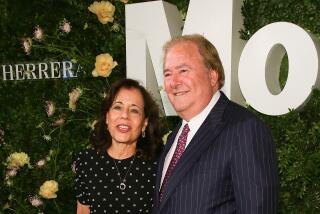Indictment Hints at Winnick
- Share via
Gary Winnick narrowly avoided paying a $1-million settlement last year when the Securities and Exchange Commission overruled its staff and decided not to fine the Global Crossing founder for allegedly failing to fully disclose financial transactions involving his telecom firm.
Two years earlier, the Justice Department quietly opted not to file criminal charges against Winnick after Global Crossing’s spectacular collapse into bankruptcy, which caused $54 billion in shareholder losses.
Now, legal experts say authorities are again scrutinizing Winnick, once considered the richest man in Los Angeles. This time the scrutiny focuses on his participation in a tax shelter that allegedly generated $300 million in phony losses.
The experts’ assessment is based on the government’s Oct. 17 indictment of 19 former KPMG executives and one outside attorney for promoting the shelters. Winnick’s name doesn’t appear in the indictment, but the 69-page document leaves little doubt that he is the person identified in the court papers as a “Beverly Hills businessman.”
Former prosecutors say the government was sending a clear message when it made 30 references to Winnick, while failing to include detailed references to 600 other people who used the shelters.
“No defense attorney wants to see his client referenced with this kind of specificity,” said William P. Keane, a former assistant U.S. attorney who practices law in San Francisco. “If nothing else, it means you are on the government’s radar.”
Another former prosecutor shares that view. “To be placed in a $300-million fraud in the middle of the largest tax indictment in history is to be in harm’s way,” said Kendall Coffey, a former U.S. attorney for South Florida who is now in private practice. “It paints a bulls-eye on the Beverly Hills businessman’s back.”
Justice Department spokeswoman Heather Tasker said the agency “can neither confirm nor deny whether there is an ongoing investigation, nor can we talk about whether anyone is a target of an investigation.”
Winnick’s lawyer, Gary P. Naftalis of New York, does not dispute that his client is the Beverly Hills businessman, or that he participated in the KPMG-designed transactions. But he said Winnick had done nothing wrong and had not been told that he was a target.
“Along with 600 other taxpayers, Gary Winnick relied on the advice and written opinions of professionals, including KPMG and respected law firms, that these transactions were proper,” Naftalis said.
In addition to Winnick, participants in KPMG-designed shelters included former California Republican gubernatorial candidate Bill Simon Jr. and Guess Inc. Co-Chairmen Paul and Maurice Marciano. But legal observers say Winnick may be an especially appealing target, given past investigations of his dealings.
“There is a general feeling, a prosecutorial mind-set, that if someone hasn’t gotten their just deserts, justice may be served in another arena,” said Lance Jon Kimmel, a Los Angeles attorney specializing in corporate and securities law.
Winnick first gained fame when he emerged unscathed from the Drexel Burnham Lambert scandal of the 1980s.
In December 1989, he was granted immunity by federal prosecutors in a deal that would have compelled him to testify against his former boss at Drexel, disgraced junk bond king Michael Milken. But Milken pleaded guilty to felony charges and Winnick never had to testify.
Winnick left Drexel in 1985 to launch Pacific Capital Group, an investment firm that was based in Beverly Hills until it relocated to Century City last year.
He used Pacific Capital to launch Global Crossing in 1996, aiming to lay 100,000 miles of high-speed telecommunications cable across the world. At the height of Global Crossing’s valuation in 1999, Winnick’s shares were worth $6.2 billion and he was crowned L.A.’s richest citizen by the Los Angeles Business Journal.
Winnick created loyalty among his firm’s employees by paying them handsomely. Even his maid became a millionaire, and he lavished Rolls-Royces and Aston Martins on top company executives and directors.
Global Crossing ultimately fell victim to a crowded telecom market and collapsed under $12.4 billion in debt in early 2002.
Former employees chafed as Winnick painstakingly renovated his 64-room, $94-million mansion overlooking the Bel-Air Country Club. Shareholder activists complained because he had pocketed more than $700 million in cash by selling Global Crossing stock since the firm’s 1998 initial public offering.
Winnick appeared before a House panel in October 2002 and pledged $25 million to help former company workers recoup part of the losses in their 401(k) retirement accounts.
“I let them down, not because we engaged in fraud or insider trading but because we ran into a difficult economic period,” Winnick testified at the hearing.
Just before Christmas that year, word leaked out that the Justice Department had decided not to prosecute Winnick.
“Santa Ashcroft gave Winnick the best Christmas gift of his life,” conservative commentator Bill O’Reilly scoffed in his syndicated column, referring to John Ashcroft, who was then attorney general.
Two years later, the SEC voted 3 to 2 to drop the agency’s case against Winnick on alleged disclosure violations, even though people familiar with the case said Winnick had agreed to pay a $1-million fine. The SEC majority ruled that he was not involved in day-to-day operations.
Winnick has been put in the spotlight again by the government’s attack on the KPMG tax shelters. KPMG, one of the “Big Four” U.S. accounting firms, has admitted criminal wrongdoing and agreed to pay $456 million to avoid prosecution.
According to the Oct. 17 indictment, the “Beverly Hills businessman” participated in a tax shelter known as BLIPS, which stands for Bond Linked Issue Premium Structure. The shelter was billed as an investment program in which bank loans were used to buy foreign currencies.
Although they did not charge him with wrongdoing, prosecutors contend Winnick used the BLIPS transaction to claim $225 million in phony tax losses in 1999, and a $75-million fake loss in 2000.
Gregg Ritchie, who has worked for Winnick’s investment firm since leaving KPMG in 1998, was accused in the indictment of making “false and misleading statements” while representing Winnick during a 2002 IRS audit by the Internal Revenue Service. Ritchie falsely told auditors that Winnick’s $225-million loss “was attributable to regular business activities of the Beverly Hills businessman’s companies,” the indictment said.
Ritchie has pleaded not guilty to charges of tax evasion and conspiracy. His attorney did not return calls seeking comment.
Stanford tax law professor Joseph Bankman said prosecuting an individual for tax fraud is generally much harder than prosecuting a tax professional, because the government must establish that the taxpayer knew the deal was fraudulent.
Wayne McEwan, former head of the IRS’ criminal investigation unit in Los Angeles said, however, that one passage in the indictment made it clear that officials believed that Winnick was more than a passive participant in the shelters.
“Both Ritchie and the Beverly Hills businessman attached a portion of the phony BLIPS losses to a number of publicly traded stocks that had already suffered large losses during the year, in order to mislead the IRS into believing that the losses resulted from those stocks’ poor performance rather than from the fraudulent tax shelters,” the indictment said.
Said McEwan: “It’s clear from the indictment that they believe Winnick’s transactions were more than just buying the tax shelter. The indictment talks about buying stocks to hide the loss.”
Terry Christensen, a Los Angeles attorney who also represents Winnick, said McEwan and others were reading too much into the indictment.
“The speculation that appears to be taking place is terribly misguided and uninformed,” Christensen said in a statement. “It is apparently based upon the fact that Mr. Winnick’s transaction as a customer of KPMG is detailed as an example in the indictment of others. There is no indication in the indictment or anywhere else of any alleged wrongdoing by Mr. Winnick.”
More to Read
Sign up for Essential California
The most important California stories and recommendations in your inbox every morning.
You may occasionally receive promotional content from the Los Angeles Times.













